- Home
- Jr. Horatio Alger
Bernard Brooks' Adventures: The Experience of a Plucky Boy Page 12
Bernard Brooks' Adventures: The Experience of a Plucky Boy Read online
Page 12
CHAPTER XII. BERNARD MEETS A FRIEND OF HIS FATHER.
|Cornelius McCracken lived in a three story and basement house onLexington Avenue. It was a solid and comfortable house, but not showy.He had a wife and three children. The eldest, a girl, had recentlymarried.
There were two boys of sixteen and eighteen, but they were notparticularly interesting, and as they were attending school Bernard didnot get well acquainted with them.
On the first morning after breakfast Bernard asked, as his guardian wasstarting for his office, "Is there anything you wish me to do?"
"No; you can go about the city and make yourself familiar with it. If Ishould get you a place here it might be well for you to know your wayabout the streets."
"I shall like that."
"Oh, by the way, have you any money for car fare, or any smallexpenses?"
"Yes, sir, I have all I shall need for the present."
Mr. McCracken looked relieved, for he was not a liberal man, and wasglad to be freed from the expense of supplying his ward with pocketmoney.
Shortly after breakfast he went out and bent his steps toward Broadway.He had been in New York before, but not for some years, and it was quitenew to him. He wandered about as chance suggested.
About eleven o'clock he was passing a barber shop on a side street, andit occurred to him that his hair needed cutting. He entered the shop,and sat down to wait his turn. He found himself sitting next a man withhair partially gray, who regarded him with some attention.
"Have you come in to be shaved?" he asked, with a smile.
Bernard smiled in return.
"No," he answered. "That can wait. I shall have my hair cut."
"You bear a striking resemblance to a man I once knew," said the oldgentleman, after a pause.
"What was his name?" asked Bernard, with natural curiosity.
"Clayton Brooks."
"That was my father," said Bernard quickly.
"Is it possible? That accounts for the resemblance. Is your fatherliving?"
"No, sir; he died ten years ago."
"I supposed he must be dead, as I had lost track of him."
"Did you know him well?" asked Bernard eagerly.
"Quite well. We were both traveling salesmen. He traveled for a jewelryfirm in Maiden Lane, I for a dry goods house. Our territory was in largepart the same, and we often stayed at the same hotel. Is your motherliving?"
"No, sir. She died before my father."
"Then you are an orphan?"
"Yes, sir," answered Bernard gravely.
"Pardon me--it is none of my business--but your father left youcomfortably provided for, did he not?"
Bernard shook his head.
"On the contrary, he left almost nothing, I am told."
"Who, then, took care of you, for you were too young to take care ofyourself?"
"A business man down town, Cornelius McCracken. He is my guardian,though there seems to be no property for him to take care of for me."
"I remember the name."
"Did you ever hear my father speak of him? I have often wondered how hecame to be my guardian."
"Yes, I remember now that your father told me he had saved a fewthousand dollars, and put it into Mr. McCracken's hands to invest forhim."
"Are you sure of this?" asked Bernard, in surprise.
"Yes. The name is a peculiar one, and I remember it for that reason."
"Then there was some property--at one time."
"Yes; I am not mistaken about that."
"It is singular that Mr. McCracken has never told me anything about it."
"Yes," answered the old gentleman slowly. "It is singular. Does he saythat your father left nothing?"
"No. He says that he left a trifle, but that it was soon exhausted, andthat he had since paid my expenses out of his own pocket."
"The money which your father put into his hands was no trifle. Theinterest alone would have paid a boy's expenses. Are you at Mr.McCracken's house?"
"Yes, sir; but I only went there yesterday. He put me at aboarding-school in the country, and I ran away."
"You don't look like a boy who would run away from school."
"I shouldn't if I had not had good cause."
"Suppose you tell me why you did it."
Bernard, upon this, told the story already familiar to the reader.
"Do you blame me for leaving Mr. Snowdon?" he asked, at the conclusionof his tale.
"No, I do not. By George, I would have done the same if I had been inyour place. Does Mr. McCracken want you to go back?"
"No; he is going to find a place for me."
"If I were in business I would give you a position in a minute. I amsure that your father's son would suit me."
"Thank you, sir. Are you still traveling?"
"No. Four years since an old uncle died and left me a good sum of money,so that I have since been able to live at ease without working. I am notan old man, still I am fully ten years older than your father would havebeen, and it is pleasant to think I can do as I please."
"I don't care to retire just yet," said Bernard, smiling.
"I should hope not. Even if you were able to live without work, I wouldnot give much for a boy who would be willing to do so."
"Next!" announced one of the barbers.
"It is my turn, I believe," said the old gentleman.
"Can you meet me to-morrow at eleven o'clock at the St. Nicholas Hotel?"
"Yes, sir."
"I may have more to say to you about your affairs. On your father'saccount, I take a great interest in you. By the way, don't say anythingto Mr. McCracken about meeting a friend of your father's."
"No, sir, I will not."
The next day Bernard kept his appointment. He had been in the hotel--nowtorn down--but five minutes, when his acquaintance of the day beforemade his appearance.
"By the way," said he, "I forgot to tell you my name."
"I thought of that after we parted," said Bernard.
"It is Alvin Franklin. There is a tradition in our family that we arerelated to Benjamin Franklin. I can't certify to it, but I hope it istrue. Here is my card.".
"Thank you, sir. I should have remembered it without a card, but I willkeep it."
"Referring to my conversation with you yesterday, I have made someinquiries of my business acquaintances."
"What did you learn, sir?"
"That his reputation is not of the best. He is not a man who is abovesuspicion, but he takes care to keep within the law. In fact, as far asI can learn, he is a tricky man."
"I hope that will never be said of me, Mr. Franklin."
"It could never be said of your father. He was as straight and honorablea man as ever lived."
"I am proud to hear you say so," said Bernard, flushing with pleasure.
"I may be a little hasty, but I can't help feeling that in some way Mr.McCracken has wronged you."
"In what way, sir?"
"I think he has not accounted to you for property your father placed inhis hands."
"The same thought came into my mind, Mr. Franklin, but I did not wish tosuspect my guardian, with nothing to go upon."
"He seems to be just the man to cheat an orphan. A man who is dishonestin one way is likely to be dishonest in another."
"Even if it is so, I suppose I have no way of proving it."
"Probably not. If there were any proofs of the trust reposed by yourfather, Mr. McCracken would be likely to destroy them. I will think overthe matter, and if I can hit upon any course that would benefit you Iwill let you know."
Bernard and his new friend talked further of his father. It was adelight to the boy to meet some one who had known the parents of whom hecould scarcely remember anything. All that Mr. Franklin had to say ofthe elder Brooks redounded to his credit, and this was naturallygratifying to his son.
When they parted, Bernard asked, "Shall I mention to Mr. McCrackenmeeting you?"
"I think not--at present."
&nbs
p; But chance ordered otherwise...
When Bernard was drawing his handkerchief out of his side pocket aftersupper, he twitched out the card, which fell to the floor.
Mr. McCracken's sharp eye detected it.
"What is that?" he asked.
"A card."
"Of course. What name is on it?"
"Alvin Franklin."
"Who is he? Is it a man you know?"
"Yes, sir. It is an acquaintance of my father."
"When did you see him?"
"To-day, at the St. Nicholas Hotel."
"Did he talk to you about your father?"
"Yes, sir."
"What did he say, and how did he happen to know him?"
Bernard answered this question, but did not think it necessary to speakof the money which his father was said to have left.
Mr. McCracken made no comment, but did not seem pleased. When Bernardwent up to bed, he said to himself, "I must get the boy out of the city.This man may tell him too much."

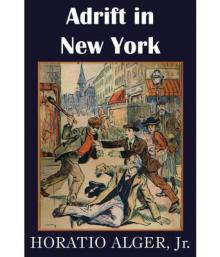 Adrift in New York: Tom and Florence Braving the World
Adrift in New York: Tom and Florence Braving the World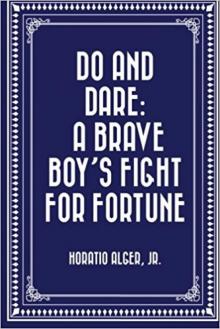 Do and Dare — a Brave Boy's Fight for Fortune
Do and Dare — a Brave Boy's Fight for Fortune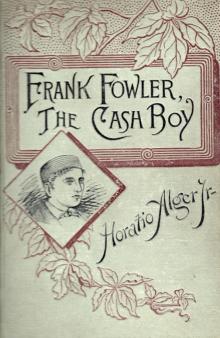 The Cash Boy
The Cash Boy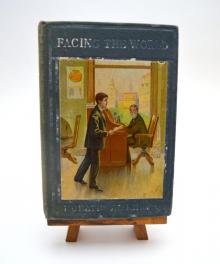 Facing the World
Facing the World The Young Explorer; Or, Claiming His Fortune
The Young Explorer; Or, Claiming His Fortune The Store Boy
The Store Boy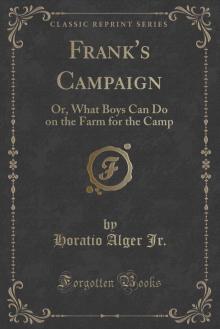 Frank's Campaign; Or, The Farm and the Camp
Frank's Campaign; Or, The Farm and the Camp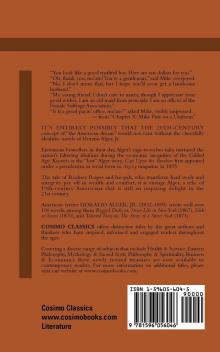 Cast Upon the Breakers
Cast Upon the Breakers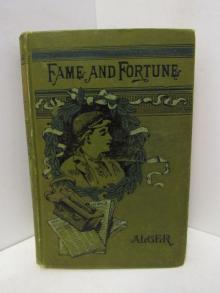 Fame and Fortune; or, The Progress of Richard Hunter
Fame and Fortune; or, The Progress of Richard Hunter The Errand Boy; Or, How Phil Brent Won Success
The Errand Boy; Or, How Phil Brent Won Success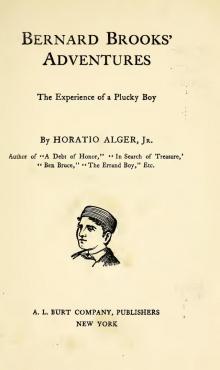 Bernard Brooks' Adventures: The Experience of a Plucky Boy
Bernard Brooks' Adventures: The Experience of a Plucky Boy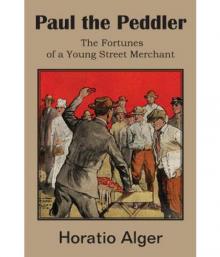 Paul the Peddler; Or, The Fortunes of a Young Street Merchant
Paul the Peddler; Or, The Fortunes of a Young Street Merchant Brave and Bold; Or, The Fortunes of Robert Rushton
Brave and Bold; Or, The Fortunes of Robert Rushton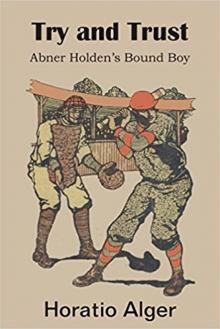 Try and Trust; Or, Abner Holden's Bound Boy
Try and Trust; Or, Abner Holden's Bound Boy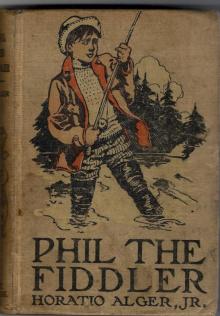 Phil, the Fiddler
Phil, the Fiddler In A New World; or, Among The Gold Fields Of Australia
In A New World; or, Among The Gold Fields Of Australia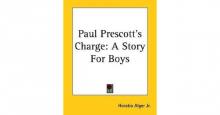 Paul Prescott's Charge
Paul Prescott's Charge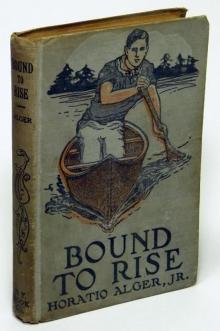 Joe's Luck; Or, Always Wide Awake
Joe's Luck; Or, Always Wide Awake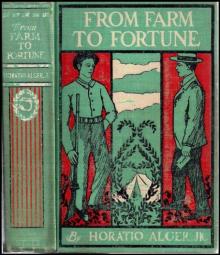 From Farm to Fortune; or, Nat Nason's Strange Experience
From Farm to Fortune; or, Nat Nason's Strange Experience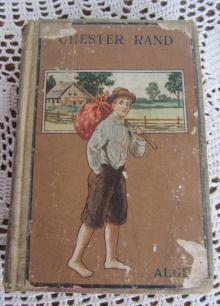 Chester Rand; or, The New Path to Fortune
Chester Rand; or, The New Path to Fortune Driven from Home; Or, Carl Crawford's Experience
Driven from Home; Or, Carl Crawford's Experience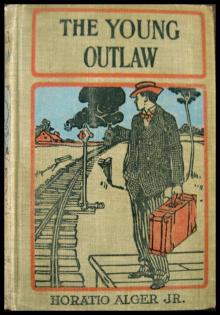 The Young Outlaw; or, Adrift in the Streets
The Young Outlaw; or, Adrift in the Streets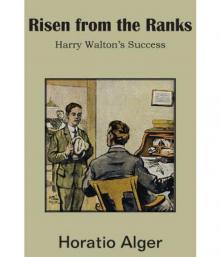 Risen from the Ranks; Or, Harry Walton's Success
Risen from the Ranks; Or, Harry Walton's Success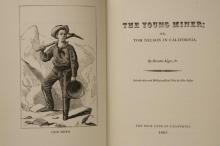 The Young Miner; Or, Tom Nelson in California
The Young Miner; Or, Tom Nelson in California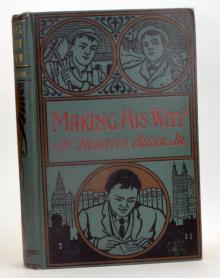 Making His Way; Or, Frank Courtney's Struggle Upward
Making His Way; Or, Frank Courtney's Struggle Upward Ben, the Luggage Boy; Or, Among the Wharves
Ben, the Luggage Boy; Or, Among the Wharves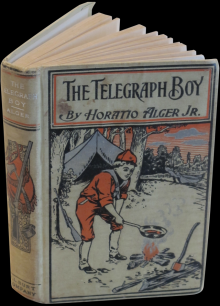 The Telegraph Boy
The Telegraph Boy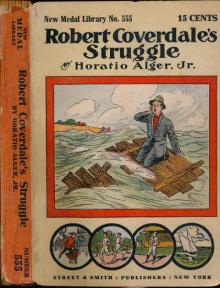 Robert Coverdale's Struggle; Or, on the Wave of Success
Robert Coverdale's Struggle; Or, on the Wave of Success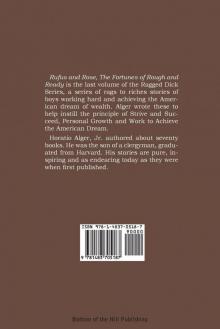 Rufus and Rose; Or, The Fortunes of Rough and Ready
Rufus and Rose; Or, The Fortunes of Rough and Ready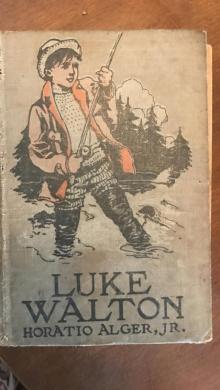 Luke Walton
Luke Walton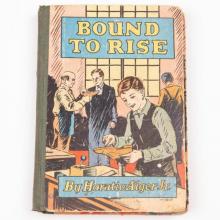 Mark Mason's Victory: The Trials and Triumphs of a Telegraph Boy
Mark Mason's Victory: The Trials and Triumphs of a Telegraph Boy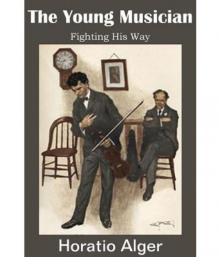 The Young Musician; Or, Fighting His Way
The Young Musician; Or, Fighting His Way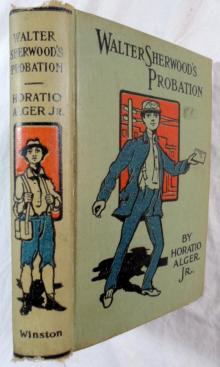 Walter Sherwood's Probation
Walter Sherwood's Probation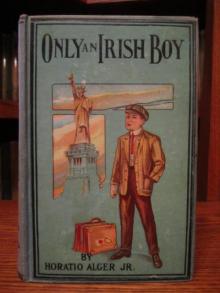 Only an Irish Boy; Or, Andy Burke's Fortunes
Only an Irish Boy; Or, Andy Burke's Fortunes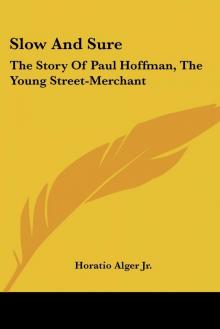 Slow and Sure: The Story of Paul Hoffman the Young Street-Merchant
Slow and Sure: The Story of Paul Hoffman the Young Street-Merchant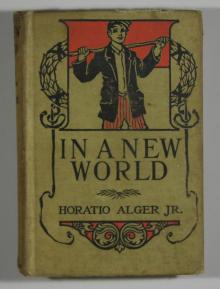 Herbert Carter's Legacy; Or, the Inventor's Son
Herbert Carter's Legacy; Or, the Inventor's Son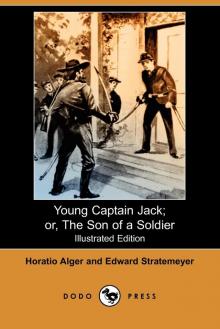 Young Captain Jack; Or, The Son of a Soldier
Young Captain Jack; Or, The Son of a Soldier Timothy Crump's Ward: A Story of American Life
Timothy Crump's Ward: A Story of American Life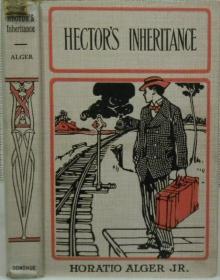 Hector's Inheritance, Or, the Boys of Smith Institute
Hector's Inheritance, Or, the Boys of Smith Institute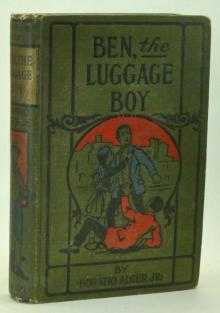 Ben's Nugget; Or, A Boy's Search For Fortune
Ben's Nugget; Or, A Boy's Search For Fortune